RMS Parthia Ephemera Collection

Sister Ships RMS Media and RMS Parthia of the Cunard Line. The Companionable Liners. 14,000 Gross Tons. 250 Passengers. First Class to Europe, 1949. | GGA Image ID # 1f2b93b7a3
Parthia (1870) Cunard Line
Operated as the RMS Parthia for the Cunard Line 1870-1884.
Built by Win. Denny & Bros., Ltd., Dumbarton, Scotland. Tonnage: 3,502. Dimensions: 360'x 40'. Propulsion: Single-screw, 13 knots. Compound engines. Masts and Funnels: Three masts and one funnel. Iron hull. Maiden Voyage: Commenced her maiden voyage from Liverpool on December 17, 1870. Service: Mainly in Liverpool-Boston service. Service Changes: Transferred to trans-Pacific service in 1887. Renamed: Victoria (1891). Acquired by Alaska Steamship Company in 1908. Alternate Configuration: Cargo Only Vessel from 1940. Converted to barge in 1954. Fate: Scrapped at Osaka in 1956. Sister Ship: Media. Owned or Operated by the Cunard Line 1870-1883; Guion Line 1885-1887; Canadian Pacific 1887-1891; Northern Pacific Steamship Company 1892-1898; North American Mail Steamship Company 1898-1901; Northern Pacific Steamship Company 1901-1904; Northwestern Steamship Company 1904-1908; Alaska Steamship Company 1908-1941; US War Administration 1941-1947; Dulien Steel Products 1952-1954; Straits Towing and Salvage Company 1954-1956. Out of Service: 1924; 1935-1938; and 1947-1954.
Parthia (1947) Cunard Line
Built by Klarland & Wolff, Ltd., Belfast, Ireland. Tonnage: 13,362. Dimensions: 518' x 70' (531' o.l.). Propulsion: Twin-screw, 17 1/2 knots. Steam turbines. Masts and Funnels: Single mast and one funnel. Passengers: 250 first class. Maiden voyage: Liverpool-New York, April 10, 1948. Note: The first Cunard Line vessel to be built by Harland & Wolff, Ltd. Sister ship: Media.
Return to Content Links
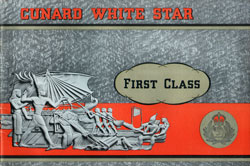
Visit Europe First Class - Cunard White Star - 1949
For Ocean Voyaging in excellent comfort, travel First Class in any of the seven Cunard White Star transatlantic luxury liners, from the resplendent Queen Elizabeth and Queen Mary, the world's largest and fastest passenger ships, to the smartly modern single-class Media and Parthia. Ships Covered in this Brochure Include the Queen Elizabeth, Queen Mary, Mauretania, Caronia, Britannic, Media and Parthia.
Return to Content Links
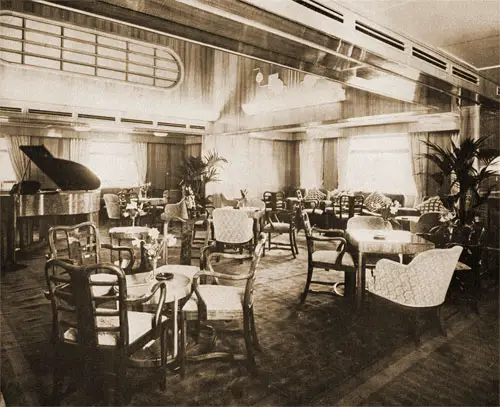
First Class Lounge on the RMS Parthia. First Class to Europe, 1949. | GGA Image ID # 1f2e55e0ac
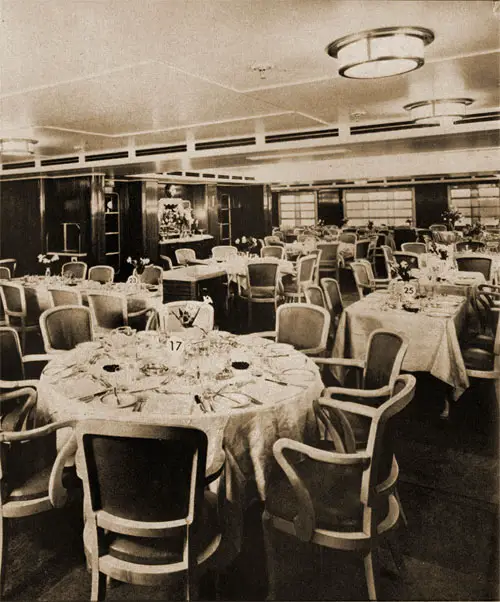
First Class Restaurant on the RMS Parthia. First Class to Europe, 1949. | GGA Image ID # 1f2edfd2a8
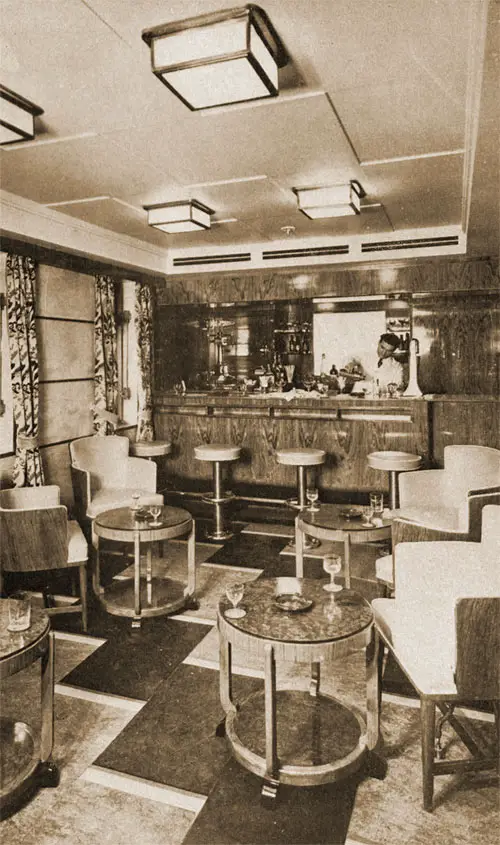
A Cozy Cocktail Bar Awaits First Class Passengers on the RMS Parthia. First Class to Europe, 1949. | GGA Image ID # 1f2f3622a7
Return to Content Links
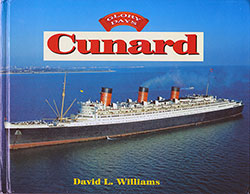
Cunard -- few names in the maritime industry are more redolent of the great days of ocean-going passenger liners and cruise ships. This book recalls the era when ocean travel by liner was at its height and the 'Queens' ruled the waves with page after page of beautiful photographs that tell its story. Glory Days: Cunard provides a vivid reminder of the lost grandeur of ocean travel.
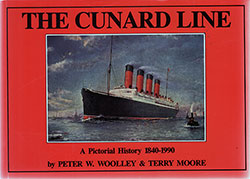
The Cunard Line: A Pictorial History 1840-1990
An Illustrated History of the Cunard Line and the celebrated liners which have served the Fleet, from its Inception in 1840 to the demise of the great transatlantic liners and finally the entry into service of the RMS Queen Elizabeth 2, Britain's last great luxury liner.
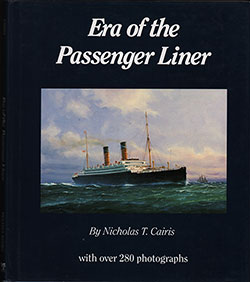
Era of the Passenger Liner - 1992
The Gilded Era comes back to life as the reader relives the careers of stately ships and express greyhounds from immigrant ships to floating palaces. Scarce, large format book containing 288pp. Features photographs, statistics, and background of 280 passenger liners, each with a picture.
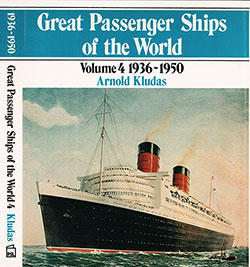
Great Passenger Ships of the World 1936-1950
The 15 years from 1936 to 1950 are covered here in the fourth volume of the series. This was the period that saw the lifting of the worldwide recession of the early '30s and the introduction of the largest passenger vessel of all time, the famous Cunarder Queen Elizabeth, and the Wilhelm Gustloff, which was considered to be the first ship built for cruising in the modern sense.

Liverpool and the Mersey, Vol. 1: Gladstone Dock and the Great Liners
More than 190 rare archive photographs and maps, many never before published, recount the story of this most famous dock and the Great passenger Ships that were once a regular sight there.

North Atlantic Passenger Liners Since 1900
Material about the most prominent steamship companies on the Atlantic Ferry today and those that have been there for some time. Some Lines have diverse services to other oceans, seas, and continents.

This book recreates the ambiance of the ocean linereraby showing the actual objects used on board. Each piece of ocean-liner memorabilia is like an aladdin's lamp, releasing wondrous memories of that grand style of travel.

Ocean Steamers: A History of Ocean-Going Passenger Steamships 1820-1970
A history of the steam-powered passenger ship that details its story from the SS Savannah of 1819 to the SS Hamburg of 1969. It contains historical details of all civilian vessels built in the intervening years, with numerous illustrations and previously unpublished material.
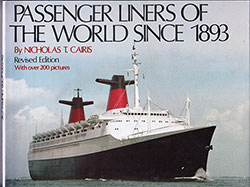
Passenger Liners of the World Since 1893
The author here takes a nostalgic look back to the heyday of the passenger ship, providing a brief history of 211 ships of over 10,000 tons, together with specifications and technical details of each.
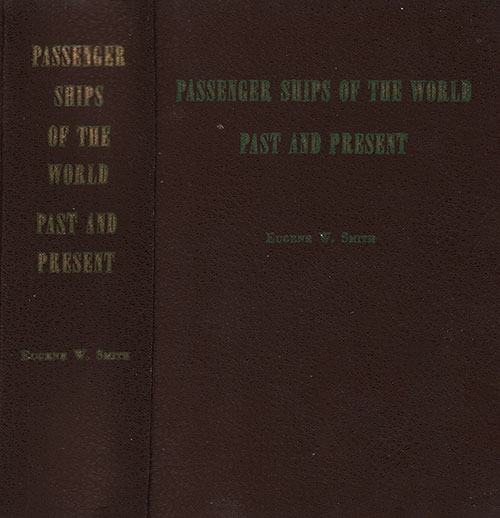
Passenger Ships of the World - 1963
🎓 “A Global Voyage Through Steamship History for Historians, Genealogists, and Maritime Enthusiasts”
Eugene W. Smith’s Passenger Ships of the World – Past and Present (1963) is a masterfully curated encyclopedic reference that charts the rise, peak, and transformation of ocean-going passenger ships through nearly two centuries. Expanding upon his earlier Trans-Atlantic and Trans-Pacific works, Smith offers a global maritime panorama that includes ships serving the Americas, Africa, Europe, Asia, Australia, and Oceania, as well as Canal routes and California-Hawaii shuttle lines.
🧭 This book is an essential resource for:
- Maritime historians seeking design evolution and fleet data
- Genealogists tracing voyages and shipping lines
- Educators and students studying transoceanic migration and tourism
- Ship modelers, naval architects, and enthusiasts interested in dimensions, tonnage, and speed

Sailing Seven Seas: History of the Canadian Pacific Line
With a witty and informative style, author Peter Pigott evokes-not only the nostalgic heyday of ocean travel but reveals a slice of almost-forgotten Canadiana.
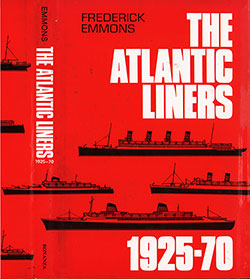
THE ATLANTIC LINERS will be cherished by all the millions of Americans who love the sea. Frederick Emmons sketches the histories of every ocean liner that sailed between the United States and Europe between 1925 and 1970.
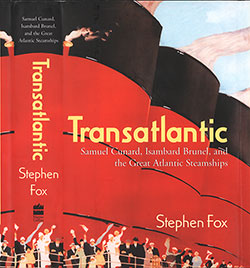
Transatlantic and the Great Atlantic Steamships
A stirring narrative of the rapid development of the great transatlantic steamships, from paddle-wheelers to the sleek luxury greyhounds of the modern era -- and the men who designed and ran them.
Return to Content Links
